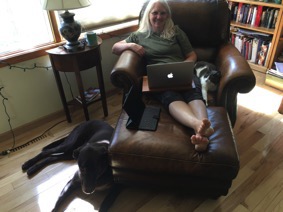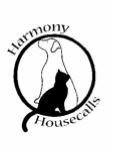2020
Cat Friendly Veterinarian
12/03/2020

I have recently completed the new Cat Friendly Veterinarian certification course for the AAFP (American Association of Feline Practitioners). It gave me a chance to review the materials on their website for clients- Cat Friendly Homes. They have added many new pages of helpful tips for navigating life with a cat.
Cats are special creatures and many hold a place in my heart. They see the world a bit differently through the eyes of predator and prey. They have keen senses and are small enough to be very concerned for their own safety, while also being skilled at stalking and hunting. Many of the problems that we see with cats have more to do with us misunderstanding their needs and perspective than an actual problem with their behavior. If we are going to bring cats into our homes, we need to understand what makes them uncomfortable or frightens them because these are the very things that drive them to "inappropriate urination," scratching furniture, and so many challenging issues that can come up when living with a cat. What is stressful to a cat may be very different from what we might assume.
Cats are often solitary animals and need their litterboxes and feeding areas to feel sheltered and protected. Here is a great place to start "What your cat needs to feel secure."
Cats can be very destructive to wild animal populations, particularly birds. Keeping them content indoors is a way for us to provide a home to the many cats in need and to enjoy their snuggly company without harming the environment. For more info on helping cats to enjoy the outdoors while protecting the birds at your feeder, check here. Cats can be harness trained for walks and an enclosed outdoor "Catio" can give them an opportunity to smell and interact with the natural world.
I have always appreciated the AAFP's handouts, guidelines, and educational information. This cat-friendly website is listed on my resource page as well.
For more cat specific info see my Cat Care page!
Telehealth Consultations
11/28/2020

Me and my COVID Coworkers!
Much of my work in supporting wellness, aging, and the navigation of end of life pathways is conversational. With the challenges of this year, I am now scheduling Telehealth
Consultations with current clients to allow us to continue to have those valuable more detailed conversations about Quality of Life, treatment options, and care decisions without risking potential human exposures through prolonged in-person contact. Treatment plans for chronic disease management including osteoarthritis, chronic renal disease, hyperthyroidism, and many others can be established and reviewed in this way. Monitoring for signs of concern including pain recognition and follow-up check-ins can also be included.
There are many times when it is important to have a physical exam and other diagnostic testing done before prescribing. Telemedicine can provide a great follow-up to those visits and much of the recheck can be done through video and discussion of changes that are being noticed. As always with my housecall practice, there are times when a patient needs to be seen at a clinic or emergency facility for care. If you are interested in scheduling a Telehealth call to go over your animal's needs and establish a care plan, contact me through email and we can coordinate a virtual visit!
COVID-19 Plans
03/25/2020
This is a very weird and scary time with this new virus upon us. There are still many uncertainties about how it is transmitted and what the real risks are. Knowing that many of my clients are elderly or potentially at a higher risk along with concern for my own health and that of my family, I will be avoiding in-person housecall visits for a while. I am currently not accepting new patients and limiting consultations to phone or video calls through FaceTime or Zoom. Much of the services that I provide do involve extensive conversation, particularly hospice and end-of-life discussions. For current patients, these can continue to be done while physically distancing. I will continue to provide follow-up care and the usual deliveries of herbal and medication refills. As always, we can refill monthly heartworm preventatives and other needs through my online pharmacy (link). The big difference is that, sadly, conversation is more limited during these deliveries. I really do appreciate hearing about you and your families and the little details of your lives with your animals. Please let me know how you are doing with all of this! I hope everyone is able to stay healthy and safe.
Local veterinary clinics, including Iowa State University for after hours, are offering continued care for essential and emergency needs through a drive-up service where a technician takes your animal into the clinic while you wait outside. The veterinarian then calls your cell phone for a consultation. I will be referring any physical appointment needs to clinics that are prepared to limit human exposures in this way. I do still want to hear from you and stay up to date with your animals’ needs and any concerns you may have during this challenging time.
My planned spring travel for teaching in the Outer Banks, NC has been postponed until fall (hopefully!) We have a new Hospice & Palliative Medicine weekend course for veterinarians planned and have our current “Veterinary Herbal Apprenticeship and Retreat” 5-module class to complete. Some of it we will be able to do online, but so much of what we teach is hands-on that we will be postponing the last 2 modules of that course as well. I am using this time to improve my teaching materials, continue learning and update my business plans. I’ll do my best to offer what veterinary services I can while supporting my own family and friends. Wishing peace and health to all, and the capacity to be kind to ourselves and work through this together in whatever ways we are able.
Local veterinary clinics, including Iowa State University for after hours, are offering continued care for essential and emergency needs through a drive-up service where a technician takes your animal into the clinic while you wait outside. The veterinarian then calls your cell phone for a consultation. I will be referring any physical appointment needs to clinics that are prepared to limit human exposures in this way. I do still want to hear from you and stay up to date with your animals’ needs and any concerns you may have during this challenging time.
My planned spring travel for teaching in the Outer Banks, NC has been postponed until fall (hopefully!) We have a new Hospice & Palliative Medicine weekend course for veterinarians planned and have our current “Veterinary Herbal Apprenticeship and Retreat” 5-module class to complete. Some of it we will be able to do online, but so much of what we teach is hands-on that we will be postponing the last 2 modules of that course as well. I am using this time to improve my teaching materials, continue learning and update my business plans. I’ll do my best to offer what veterinary services I can while supporting my own family and friends. Wishing peace and health to all, and the capacity to be kind to ourselves and work through this together in whatever ways we are able.
Speaking of Hospice and Herbs
02/27/2020
This month I had the opportunity to spend a day speaking to veterinarians at the Midwest Veterinary Conference. I spoke for 6 hours about Integrative Medicine in Animal Hospice and Palliative Care, particularly herbal medicine and how it can be used to support animals in their geriatric years and to improve comfort at the end-of-life. In my practice, I use individualized herbal formulas to treat nausea, constipation and diarrhea, liver and kidney disease, skin conditions, pain and inflammation, as well as some infections and cancers. As an integrative veterinarian, I also use pharmaceutical medications when needed, but can often avoid their use by supporting the general well-being and healing capacity of the body with herbs and other complementary treatments.
I ended the day by talking about Compassion Fatigue and the importance of Self-Care for caregivers, including veterinarians and their staff, along with caregiving families dealing with the stress and increased needs of animal loved ones nearing the end of life. These are all topics that are near and dear to me. They speak to my overall approach to providing veterinary care that supports both the patient and the family, particularly during the difficult time as life draws to an end. Hospice and end-of-life care emphasize living the best Life possible during the time remaining.
I would much rather start these conversations sooner than later. Please contact me if you would like a consultation about herbal supportive medicine for your geriatric animal or if you are struggling with end-of-life care decisions. These are difficult topics to bring up, but with some support and a plan in place, the challenges might be a bit easier to manage. I would like to be there to help.
I ended the day by talking about Compassion Fatigue and the importance of Self-Care for caregivers, including veterinarians and their staff, along with caregiving families dealing with the stress and increased needs of animal loved ones nearing the end of life. These are all topics that are near and dear to me. They speak to my overall approach to providing veterinary care that supports both the patient and the family, particularly during the difficult time as life draws to an end. Hospice and end-of-life care emphasize living the best Life possible during the time remaining.
I would much rather start these conversations sooner than later. Please contact me if you would like a consultation about herbal supportive medicine for your geriatric animal or if you are struggling with end-of-life care decisions. These are difficult topics to bring up, but with some support and a plan in place, the challenges might be a bit easier to manage. I would like to be there to help.
